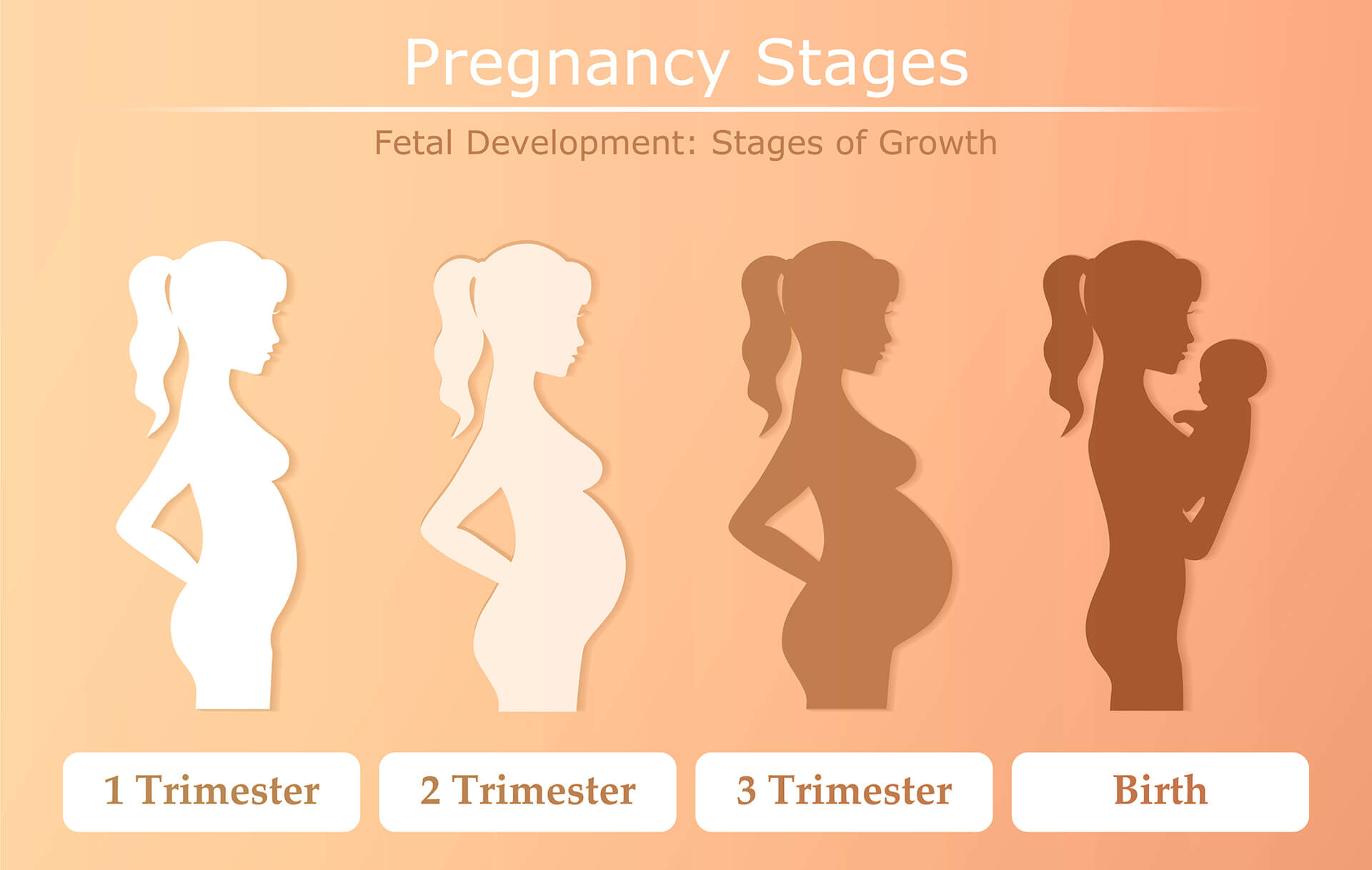
Stages of Pregnancy: A Comprehensive Guide
Pregnancy, a transformative journey that spans approximately 40 weeks, is characterized by distinct stages marked by significant physiological and emotional changes. Understanding these stages is crucial for expectant mothers and their healthcare providers to ensure optimal prenatal care and a healthy pregnancy outcome.
First Trimester (Weeks 1-12)
- Week 1-4: Conception occurs when a sperm fertilizes an egg, forming a zygote. The zygote travels through the fallopian tube and implants in the lining of the uterus, a process known as implantation.
- Week 5-8: The embryo develops rapidly, forming the major organs and systems. The placenta, a vital organ that facilitates nutrient exchange between the mother and fetus, begins to develop.
- Week 9-12: The fetus continues to grow and develop. The limbs, facial features, and genitalia become more distinct. The heart is fully formed and begins to beat regularly.
Second Trimester (Weeks 13-28)
- Week 13-16: The fetus grows rapidly, gaining weight and length. The mother may experience a surge in energy and an increase in appetite.
- Week 17-20: The fetus becomes more active, with increased movement and responsiveness to external stimuli. The mother’s uterus expands, and the baby bump becomes more noticeable.
- Week 21-24: The fetus continues to grow and develop. The lungs and digestive system begin to mature. The mother may experience Braxton Hicks contractions, which are practice contractions that prepare the body for labor.
- Week 25-28: The fetus gains significant weight and body fat. The mother’s body prepares for breastfeeding, with the breasts becoming larger and producing colostrum, a nutrient-rich fluid that precedes breast milk.
Third Trimester (Weeks 29-40)
- Week 29-32: The fetus continues to grow and mature. The lungs are fully developed, and the baby is capable of breathing on its own. The mother’s body produces relaxin, a hormone that relaxes the ligaments and muscles in preparation for labor.
- Week 33-36: The fetus gains weight and prepares for birth. The head becomes engaged in the mother’s pelvis, and the baby may begin to descend. The mother may experience increased back pain and pelvic pressure.
- Week 37-40: The fetus is fully developed and ready for birth. The mother’s cervix begins to soften and dilate. Labor typically begins with contractions that become stronger and more frequent over time.
Physiological Changes During Pregnancy
Throughout pregnancy, the mother’s body undergoes significant physiological changes to accommodate the growing fetus. These changes include:
- Increased Blood Volume: Blood volume increases by up to 50% to meet the demands of the fetus and placenta.
- Uterine Expansion: The uterus expands dramatically to accommodate the growing fetus.
- Hormonal Changes: Pregnancy hormones, such as progesterone and estrogen, fluctuate throughout pregnancy, influencing various bodily functions.
- Cardiovascular Changes: The heart rate and blood pressure increase to meet the increased blood volume.
- Respiratory Changes: The diaphragm rises to accommodate the expanding uterus, affecting breathing patterns.
- Gastrointestinal Changes: Nausea, vomiting, and constipation are common due to hormonal changes and increased pressure on the digestive system.
- Musculoskeletal Changes: The ligaments and muscles relax to prepare for childbirth.
- Breast Changes: The breasts enlarge and produce colostrum in preparation for breastfeeding.
Emotional Changes During Pregnancy
Pregnancy is also associated with a range of emotional changes, including:
- Mood Swings: Hormonal fluctuations can lead to mood swings, irritability, and emotional sensitivity.
- Anxiety and Stress: Concerns about the pregnancy, labor, and the future can trigger anxiety and stress.
- Fatigue: Increased energy demands and hormonal changes can lead to fatigue.
- Increased Libido: Some women experience an increase in sexual desire during pregnancy.
- Bonding with the Baby: As the pregnancy progresses, the mother may develop a strong emotional bond with the baby.
Prenatal Care
Regular prenatal care is essential for monitoring the health of both the mother and the fetus. Prenatal appointments typically include:
- Physical Examination: The healthcare provider will check the mother’s blood pressure, weight, and overall health.
- Fetal Monitoring: The healthcare provider will use ultrasound or other methods to monitor the fetus’s growth, development, and heartbeat.
- Laboratory Tests: Blood and urine tests are used to screen for potential complications and assess the mother’s health.
- Education and Counseling: The healthcare provider will provide information about pregnancy, labor, and postpartum care.
Conclusion
Pregnancy is a complex and transformative journey that involves significant physiological and emotional changes. Understanding the stages of pregnancy and the associated changes can help expectant mothers navigate this journey with confidence and ensure optimal health for themselves and their baby. Regular prenatal care is crucial for monitoring the well-being of both the mother and the fetus and providing timely interventions if necessary.